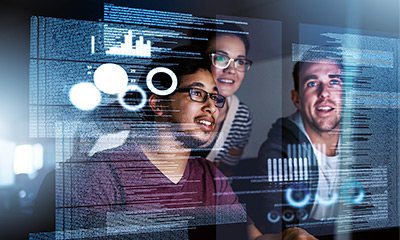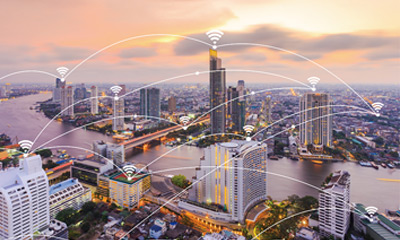The World at an inflection point
Fujitsu Technology and Service Vision 2021
In the Fujitsu Technology and Service Vision 2021 edition, we introduce five important trends that will shape the new world after the inflection point. We also explain how our commitment to responsible business will help to build a more sustainable world. We share future scenarios in specific focus areas and outline how technology innovations are already making these future scenarios a reality.
COVID-19 has had a huge global impact on social and economic activity. Based on our recent survey and discussions with business leaders, we share the five trends that will shape the future.

2020: The World shut down

The COVID-19 pandemic has threatened our lives, and had a huge impact on social and economic activity. As of May 2021, over 170 million people have been infected, with more than 3.5 million precious lives lost.
Until the vaccine was available, there was no effective mitigation other than avoiding physical contact with other people. As a result, emergency lockdown measures were imposed on many cities around the world, creating major upheaval to both supply and demand. The global economy entered an unprecedented recession. In 2020, global GDP fell by 3.3%, with unemployment rising significantly in many countries. Inevitably, this increased the number of people living in poverty, following decades in which poverty has been decreasing. With an additional 88 million people now living in extreme poverty, more than 700 million people around the world are estimated to live on less than $1.90 a day.
By restricting people's movement, the pandemic effectively reversed the trend toward globalization. The annual number of people traveling abroad decreased by 1 billion, with the tourism industry's total revenue hit by over $1.3 trillion. Meanwhile, schools have been shut down around the world, with as many as 1.5 billion students unable to attend physical lessons.
This was a global phenomenon, with these upheavals occurring simultaneously in almost every country worldwide. As a result, an immense number of people experienced the loss and disruption of their normal, everyday lives.
Impact caused by the pandemic

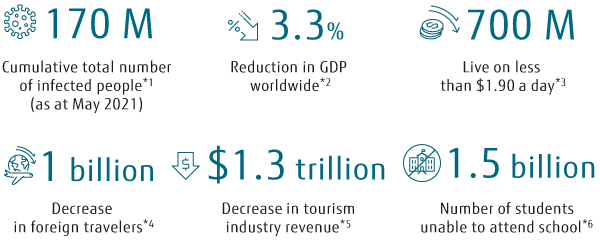
*1 WHO, *2 IMF, *3 *6 World Bank, *4 *5 UNWTO
2020: Responding to the crisis

How have people responded to this crisis?
As cities were shut down or placed in a state of emergency, a significant number of organizations around the world chose to adopt working from home. For example, Fujitsu’s 80,000 employees in Japan shifted to remote working immediately upon the state of emergency being declared. We listened to our colleagues to find ways to fundamentally improve the wellbeing of over 130,000 employees around the world. This has led us to adopt a completely new hybrid working model that allows our people to work remotely.
Digital technology played a major role in responding to this crisis.
Working from home has led to a rapid rise of online conference traffic worldwide. At the same time, online shopping at home has grown, boosting the annual global e-commerce market by 27.6%. *7 Many schools have also begun offering online education. A senior executive of a university told us, “What we’ve been discussing for years became a reality in just a week”.
It is truly humbling and commendable that healthcare professionals have exposed themselves to the risk of infection while devoting themselves to the treatment of patients around the world. The pandemic has highlighted the critical importance of wellbeing. Senior executives have seen how the health and happiness of employees and their families, as well as customers and communities, underpins the ongoing success and sustainability of their businesses.
*7 Insider Intelligence
Into the human era
What should this future look like?
What is beyond the inflection point?
We believe it must be more firmly oriented around people. Until now, organizations have used rigid business structures to drive efficiency, increase profits and deliver value to a limited range of stakeholders. The future, however, is about flexible workplaces and flexible business processes. Organizations need to understand where they fit in society, delivering value to multiple stakeholders and being socially responsible.
Organizations have previously defined themselves as B2C (Business to Consumer) or B2B (Business to Business). But this new era will be 'Business to Everyone' (B2E), building everything they do around people.
Providing human-centric value
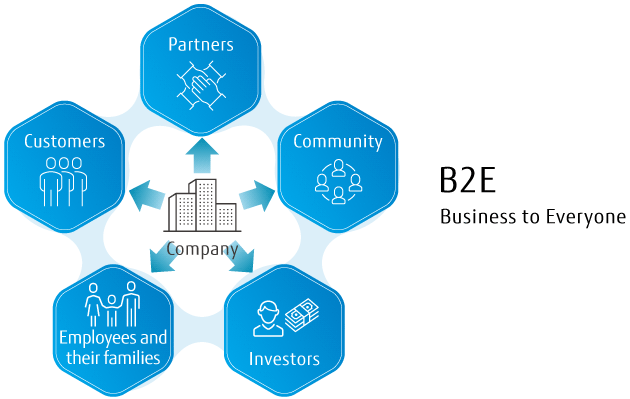
B2E requires businesses to focus on the needs of all people, whether that’s employees, customers, or citizens of society at large. B2E is about organizations becoming relevant to everyone.
Priorities in a new world
What are the priorities in the post pandemic new world?
According to Fujitsu’s survey, business leaders recognize the importance of resilience, the capability to respond to changes, as the top priority in the post pandemic world. Many business leaders also noted that business process automation and data-driven management as well as providing seamless customer experience (where online merges with offline) were critical. In addition, human-centric management (empowerment) was cited as important, along with purpose-driven management, trust from customers and communities, and ecosystem business models.
Important to business in the new world after COVID-19

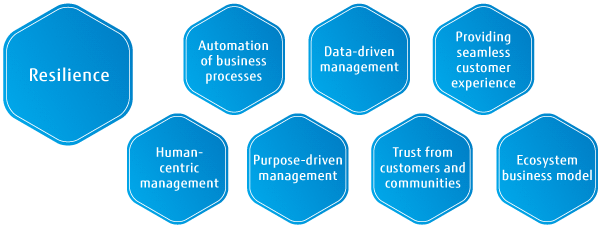
Based on our survey and dialogues with business leaders, we have therefore identified five trends that will shape the new world. We introduce four trends that characterize how organizations will change, and the fifth trend that underpins and accelerates them.
5 trends
1. Sustainability first
The challenges of climate change are threatening the sustainability of our planet. Creating an equal society where no one is left behind has become an urgent imperative that business can no longer ignore.
Environmental and social issues are becoming more serious

The pandemic changed the mindset of business leaders. In our global survey, 78% of business leaders said the importance of delivering value to society had increased as a result of COVID-19. We also found that 71% of organizations planned to increase their contribution to society in line with the United Nations Sustainable Development Goals (SDGs).
Sustainability is a management priority
The stakeholders of organizations, including shareholders, customers, employees and the communities and wider society they support, are increasingly demanding ethical behavior and a greater contribution to solving environmental and societal challenges.
Business goals need to be aligned with societal goals. Purpose has a critical role to play. Being purpose-driven allows organizations to remain relevant to customers, employees and wider society.
How can we address these difficult challenges? In our survey, 91% of business leaders told us digital transformation had helped them to deliver societal value. Digital technology has rapidly become a key enabler of innovation, driving sustainability and wider benefits for society.
- What role will your organization play in driving sustainability?
- How can you ensure that delivering social value is part of the way your business operates?
2. Finding resilience
More than ever, organizations need to operate in a state of constant evolution. The pandemic was a once-in-a-lifetime shock, creating unprecedented turmoil and continuing disruption.
In amongst the chaos, new management priorities have emerged. In our survey, resilience was chosen as the most important objective for businesses in the post pandemic world.
In the old world, organizations focused primarily on the efficiency of their operations. Maximizing output while minimizing cost. However, now, we need to put more weight on resilience than efficiency.
Resilience goes hand in hand with adaptability. In our global survey, organizations that responded effectively to changes caused by the pandemic cited three main reasons for their success. Firstly, they were agile in their response. Secondly, they had already digitalized their business or had accelerated the digitalization process. Thirdly, they had made employee wellbeing their top priority.
The reasons organizations have been able to effectively respond to changes caused by the pandemic
In these uncertain times, the capability and culture to enable agile transformation and human-centric management are crucial. In addition, it’s essential to sense what is likely to happen outside the organization, using real-time data instead of relying on past experience.
- What measures are needed to increase the agility of your organization?
- What data would help you sense how your external business environment is changing?
3. Borderless lives
Work and home life were once completely separate. However, in 2020, home replaced the office as the workplace. According to Fujitsu’s global survey, two out of three organizations reported that their employees are now working remotely for more than 40% of their total working time.
Of course, remote working has created fresh challenges. How do people still co-ordinate and collaborate effectively? How do you best manage a remote workforce? It’s clear that people remain an organization’s most important asset. In our survey, 89% of leaders said the wellbeing of employees will have a major impact on the mid to long-term performance of their business.
As we move past this inflection point, how will people live and work? In our survey, half of organizations expected more than 40% of employees to work remotely in 2025, even after the pandemic is over. Managers expect hybrid working to become the norm, rather than returning to traditional workplaces.
Shift to hybrid-working
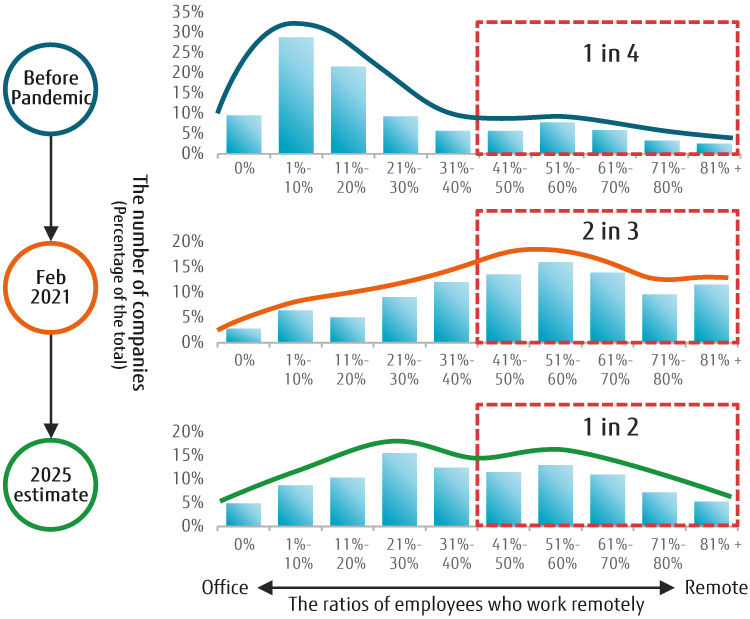
Physical experiences and digital experiences, and the concepts of office and home, are converging. What are the implications for our cities? The population in Tokyo decreased in eight consecutive months during the pandemic, the first time this had ever happened. Similar trends are happening in other countries, as people move to work remotely. Some companies are moving their offices away from urban centers. We have the opportunity to rebuild a more decentralized society, where people can work wherever they want to live.
- What new opportunities will come from hybrid working and how will we address the risks?
- How will you use technology to get the best out of your people?
4. Business is ecosystems
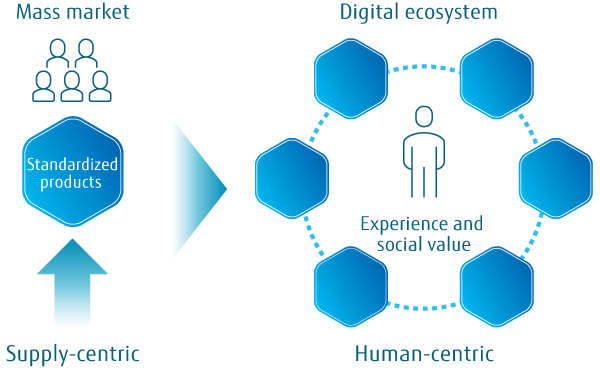
Shift to an ecosystem business model that co-creates human experience and social value
In the industrial era, businesses created supply-centric value chains within specific vertical industries, producing standardized products.
However, digitalization is rapidly breaking down vertical industry silos, replacing them with an ecosystem business model that co-creates services and experiences, built around people’s needs and lifestyles. For example, financial services are becoming invisible through blending into other services such as education, healthcare and daily shopping or real estate transactions. Automobiles are becoming mobility services. Cross-industry ecosystems make this kind of transformation possible.
The pandemic accelerated digitalization significantly, making this transformation irreversible. In the new world, ecosystems with data and digital technologies are becoming the mainstream of business.
So, what should we do now? We have looked at environmental and social issues in the ‘Sustainability First’ trend. These difficult challenges are faced by governments, companies, as well as consumers across many countries and industries. Solving these systemic challenges is impossible with individual efforts alone. An ecosystem approach based on transparent and reliable data is essential. We need to share a vision for a new society where we can all co-create social value.
- What organizations or industries are part of your ecosystem?
- What data would you need to maintain and grow successful ecosystems?
5. Trusted automation
Technology and data underpin and enable all four of these trends.
In the post pandemic new world, data plays a major role in every aspect of business processes. In our survey, 79% of organizations said that the use of data is now a key tool in responding to the challenges of COVID-19, while 83% reported that data-driven management is essential to stay competitive in the future. What will business operations look like in the new world? Our survey found that 82% of business leaders were planning to increase their investment in automation. Moreover, 44% of business leaders expect that more than half of business processes that had not yet been automated would be automated by 2025.
Data-driven and Automation
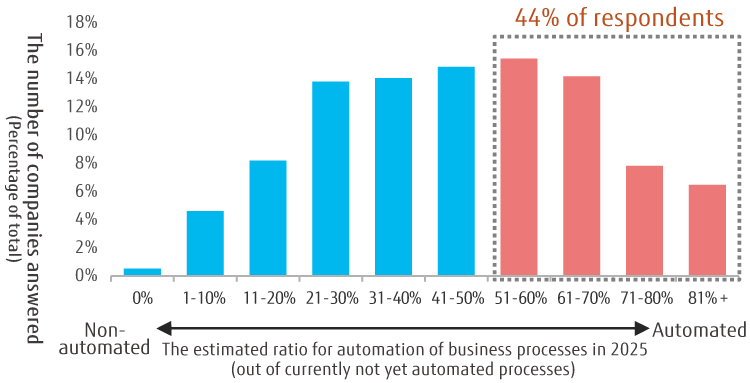
We need to redesign the way people and technology work together in these data-driven, highly automated businesses. Naturally, there are tensions between them, including the impact of automation on employment. How do we solve this challenge? Ethics are essential to good management, while technology must be trusted by people. People and technology need to collaborate to solve social issues and make the world more sustainable.
- How do you ensure that trust and ethics are built into your plans for automation?
- How will you build stronger partnerships between people and technology?
Fujitsu Future InsightsGlobal Digital Transformation Survey Report 2021Priorities in the post-pandemic world


Other articles of Fujitsu Technology and Service Vision 2021
- 2020: The World shut down
- 2020: Responding to the crisis
- Into the human era
- Priorities in a new world
- 5 trends
- 1. Sustainability first
- 2. Finding resilience
- 3. Borderless lives
- 4. Business is ecosystems
- 5. Trusted automation


